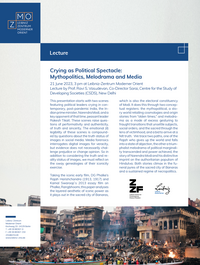Begin: 3:00 pm
Lecture by Prof. Ravi S. Vasudevan (Sarai/Centre for the Study of Developing Societies, Delhi/Indien)
This presentation is organised jointly by Leibniz-Zentrum für Zeithistorische Forschung Potsdam und Leibniz-Zentrum Moderner Orient.
The presentation starts with two scenes featuring political leaders crying in contemporary, post-pandemic India, the Indian prime minister, Narendra Modi, and a key opponent of that time, peasant leader Rakesh Tikait. These scenes raise questions of performativity and authenticity, of truth and sincerity. The emotional (il) legibility of these scenes is compounded by questions about the truth status of images in social media. Media forensics interrogates digital images for veracity, but evidence does not necessarily challenge prejudice or change opinion. So in addition to considering the truth and reality status of images, we must reflect on the sway genealogies of their iconicity exercise.
Taking the iconic early film, DG Phalke’s Rajah Harishchandra (1913, 1917) and Kamal Swaroop`s 2013 essay film on Phalke, Rangbhoomi, this paper analyses the layered aesthetic of iconic power as it plays out in the sacred city of Banaras, which is also the electoral constituency of Modi. It does this through two conceptual registers: the mythopolitical, a story world retailing cosmologies and origin stories from “olden times;” and melodrama as a mode of excess gesturing to fraught transitions that unsettle subjects, social orders, and the sacred through the lens of victimhood, and a bid to arrive at a felt truth. We trace two paths, one of the Rajah who gives up the world and falls into a state of abjection, the other a triumphalist melodrama of political marginality transcended and power achieved, the story of Narendra Modi and his distinctive imprint on the authoritarian populism of Hindutva. Both stories climax in the funeral pyres of the sacred city of Banaras and a sustained regime of necropolitics.
Ravi Vasudevan is a film and media historian. His publications include Making Meaning in Indian Cinema (ed., 2000), The Melodramatic Public: Film Form and Spectatorship in Indian Cinema (2010, 2015), Media and the Constitution of the Political: South Asia and Beyond (ed., 2021) and Documentary Now, (ed., 2018) the Marg special issue on contemporary documentary. With Ravi Sundaram, Vasudevan directs Sarai, the media research programme of the Centre for the Study of Developing Societies. He co-founded Bioscope: South Asian Screen Studies (2010-), and is one of the coordinators of the media module of the International Centre for Advanced Studies: Metamorphoses of the Political (ICAS:MP) He is currently working on non-fiction film infrastructures, the film archives and questions of historiography; film and the history of publicity; film, media and mythopolitics; post-cinema media artefacts and political imaginaries.
Leibniz-Zentrum Moderner Orient
Kirchweg 33
14129 Berlin
Eine Anmeldung ist nicht erforderlich.
Kontakte:
Leibniz-Zentrum Moderner Orient
Kirchweg 33, 14129 Berlin
Tel.: 030/80307-0
E-Mail: zmo [at] zmo [dot] de
Leibniz-Zentrum für Zeithistorische Forschung Potsdam
Prof. Dr. Frank Bösch
E-Mail: sekretariat [at] zzf-potsdam [dot] de (sekretariat[at]zzf-potsdam[dot]de)

